Head of the Austrian SS before and after the Anschluss and successor to Heydrich as Head of RHSA, SS Security, Gestapo and SD after the latter's assassination; also took over control of the Abwehr (German military intelligence) after the dissolution of Canaris's command; was hanged as a major war criminal in 1946, although he protested at his trial in Nuremberg that he was serving as a substitute for Himmler, already dead by poisoning.

Japanese Chief of Staff of Japanese forces in China in early 1942, assumed command of the army in Burma in 1943, and planned the offensive against Imphal and Kohima that was part of the unsuccessful invasion of India in 1944; relieved of command and sent back to Japan to control Japan's Central Area, was appointed to head the Army Air Forces in 1945.
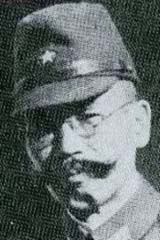
Chief of Staff of the German High Command (OKW) from 1938 with a reputation for subservience to Hitler that earned him the nickname 'Lakeite', a coinage from 'lackey - Keitel'; attended all significant German conferences on the conduct of the war and signed operational orders; after the attempt on Hitler's life in July 1944, sat as a member of the 'Court of Honor' which sentenced many high-ranking officers to death; after the war, was included among the major war criminals tried at Nuremberg, charged with responsibility for issuing in 1941 the Nacht und Nebel decree on Hitler's orders, it deliberately initiated a new dimension of fear in Germany by declaring that enemies of the state would disappear into 'Night and Fog' and that no information of any kind would be available to friends and relatives of missing persons; was hanged in 1946.
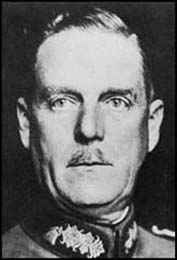
US ambassador to Great Britain from 1937-41; was a highly successful business magnate whose view of potential war in Europe was conditioned by his concern for economic stability; shared this essentially commercian viewpoint with Prime Minister Neville Chamberlain, and consistently advocated the concession of German territorial demands; strongly opposed to British entry into the war on Poland's behalf and a committed isolationist, nevertheless supported US aid to Britain in a war he was sure Germany would win; this undoubted sympathy did not extend to the level of support envisaged by the Lend-Lease Act, which he opposed after his recall to the US early in 1941; the Japanese attack on Pearl Harbor completely discredited the powerful isolationist lobby inside the US and Kennedy's political position declined from that point.

commanded US Far East Air Forces in the Southwest Pacific Area; was a US Air Service squadron commander in France in World War I; was General Douglas A. MacArthur's principal air officer in World War II.
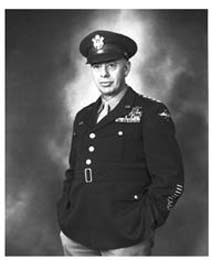
arguably the most successful German general in the war, commanding the German withdrawal up the Italian peninsula that held superior Allied foeces for 20 months; a Bavarian-born regular soldier, served as an artilleryman and a general staff officer in the first war; in order to tak a post as head of administration with the newly formed and still illicit Luftwaffe, learned to fly at the age of 48; when the Luftwaffe's first commander, General Wever, was killed in an air crash in 1936, took over as Chief of Staff; commanded Luftflotte I in Poland in 1939, and in 1940 led Luftflotte II in the campaign in the Low Countries and France; during the Battle of Britain directed Luftflotte II in highly effective raids on air bases in southeast England, though it can be argued that he made his only serious tactical error in underrating the RAF's ability to resist daylight attacks; the advantage gained by Luftflotte II was ultimately wasted by Göring's decision to redirect the Luftwaffe against London; from the west, was transferred with Luftflotte II to the Eastern Front for 6 months before his appointment to the Mediterranean theater as C-in-C South and subsequently commander of all German forces in the Mediterranean; jointly directed the campaign in North Africa with General Rommel, leading the Axis' withdrawal from Tunisia; as C-in-C in Italy in 1943 and 1944, fought the classic defensive campaign against a stronger, better-equipped enemy on which his reputation as a general rests; in March 1945 had already opened negotiations with the American intelligence chief, Allen Dulles, for a separate surrender when Hitler transferred him to the Western Front to succeed Field Marshal von Rundstedt as C-in-C West; but by then no generalship of whatever quality could turn the tide of the Allied successes and Kesselring surrendered to American forces on May 7, 1945; in 1947 a British court found him guilty of ordering the execution of 335 Italian civilians and was sentenced to life imprisonment; the conviction was in fact an extreme interpretation of the concept of a commander's responsibility for the acts of his troops, notwithstanding the command contidions of the last days in Italy when the campaign was characterized by intense partisan activity and drives by SS formations who were a law unto themselves; many British jurists and senior officers later became concerned at the court's verdict; his British opponent, Field Marshal Alexander, was among those who expressed serious doubts, as an indirect result of which was released from prison in 1952, officially on grounds of ill health; before his death in 1960, was appointed president of the ex-servicemen's associtation Stalhelm.
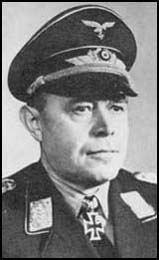
Post-war Soviet leader from 1953, became a member of the Politburo in March 1939; was responsible for supervising the annexation of eastern Poland and subsequently served as political commissar on the Western and Southwest Fronts; remaining on the Southwest Front following the defeat at Kharkov and the dismissal of General Timoshenko in May 1942, was posted to the Ukrainian Central Committee after the liberation of Kiev in Novermber 1943, and was responsible for the purges of Ukrainian nationalist forces that brought the Ukraine uder Soviet control.

American veteran of WWI, was appointed to command the Cruiser Battle Force in 1939; became C-in-C of the US Fleet (renamed the Pacific Fleet) based at Pearl Harbor in February 1941 and therefore carried much of the blame for the unpreparedness of US naval forces and the scale of the disaster following the surprise Japanese attack in December; although continued in command until the endo fhte month, was eventually replaced by Admiral Nimitz and charged with dereliction of duty by a board of inquiry, as a result of which he retired in 1942; a Congressional Inquiry set up in 1946 to investigate the causes of the tragedy at Pearl Harbor, however, cleared him of the charge; in 1955 he published a personal account, entitled 'Admiral Kimmel's Story', of his time at Pearl Harbor.

C-in-C of the US Fleet and Chief of Naval Operations, was arguably the most important American naval figure of the war and one of the chief architects of the American victory in the Pacific; served on the Combined Chiefs of Staff Committee and attended all the major Allied Conferences throughout the war, gaining a reputation as an abrasive and argumentative, though highly able, strategist and a committed advocate of the United States' special responsibility in the Pacific; though criticized early on as a traditional naval strategist, his background in naval aviation and carrier command prepared him well to salvage the disaster at Pearl Harbor and recognize, develop and exploit the innovations in naval warfare that were essential to American success in the Pacific; with its increasing emphasis on air power, the carrier and amphibious warfare, the US Fleet also grew quickly in size and experience under King to become a supremely effective naval force, which in sheer numbers surpassed the combined strength of all other navies by 1945; in 1942, however, the huge task of developing the strength of the US Fleet was combined with the immense responsibility for co-ordinating not only joint US forces operations but Allied naval operations as well; his achievement in directing the huge strategic and logistical scope of the war should not be underestimated; although he presided over the planning and resourcing of major naval operations in the Atlantic, North Africa and Europe, his primary responsibility (as he saw it) was the Pacific, where his greatest contribution was made; limited in the early stages by lack of resouces to adopting defensive strategies for both ocean theaters, he persistently argued for the direction of American resources to the Pacific, both with the Combined Chiefs and at Allied Conferences gaining a reputation, particularly among his Allied colleagues, for unbridled chauvinism in his advocacy of the Pacific War; though unable to convince his Allied counterparts, he nevertheless went on to direct American efforts during the second half of 1942 that turned the tide of Japanese conquests in the Pacific and enabled the US to go on the offensive, scoring some crucial victories with the new tactics of amphibious warfare that pushed Japan decisively onto the defensive; in overall control of deployments in the Pacific Ocean Areas, often came into conflict with General Douglas MacArthur, Supreme Commander of the Southwest Pacific Area, over the assignment of priorities for Pacific offensives; nevertheless, as US Fleet strength and experience grew steadily, was increasingly able to count on its strategic and tactical superiority over the Japanese Fleet and establish himself as a pre-eminent figure in the development of modern naval logistics; promoted a five-star full fleet admiral in December 1944, received the greatest of many acknowledgements of his contribution with characteristic relish.
was both commander in chief of the US Navy and chief of naval operations; after his failure to mobilize adequately against German U-boat operations along the East Coast in 1942, he helped plan the great naval offensives in the Pacific theater until 1945; Washington-based naval commander behind the Pacific campaigns such as the conquest of the Marianas (1944), the US return to the Philippines (1944-45), and the Battles of Iwo Jima (1945) and Okinawa (1945).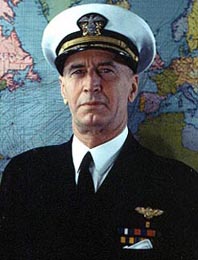
Canadian prime minister from 1921 to 1930 and from 1935 to 1946; was a scholar, author, and shrewd politician who abandoned an isolationist stance to lead his country to Britain's side in 1939; seeking to avoid conscription, built up Canada's naval and air services before expanding the army and committing it to overseas duty; worked for Canadian-American amity and was an effective war leader.
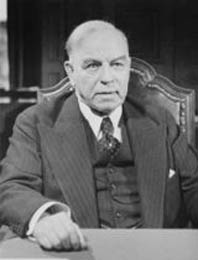
highly respected American naval commander of Pacific carrier forces, initially based on the Enterprise and Hornet which fought several important naval engagements during 1942, including the Coral Sea, Midway, Santa Cruz and Guadalcanal battles; after the naval battle of Guadalcanal in November, was put in command of a cruiser squadron, Task Force 67, which was assigned to prevent Japanese reinforcement transports from reaching Guadalcanal; in January 1943, was appointed Commander, North Pacific Fleet, but was promoted in November to command the US 7th Fleet, a convoy and support fleet composed of escort carriers and old battleships, under Southwest Pacific forces commander, General MacArthur; in October 1944, the 6th Fleet transported the 6th Army for the assault on Leyte, fighting in the Battle of Leyte Gulf and covering General MacArthur's campaigns in Leyte and later on Luzon; was promoted admiral in April 1945.

led the Central Task Force in the 1943 Sicily invasion; with his flag aboard the cruiser USS Augusta, commanded the 1,000-vessel fleet that landed Bradley's US 1st Army in Normandy on D-Day in June 1944.

consistently successful German tank commander, with overall command of 2 panzer groups for the Western Offensive, and commander of Panzer Group I on the Eastern Front for the invasion of Russia in 1941, where he spearheaded the advance of Army Group South toward Kiev; earned particular distinction in the Caucasus during 1941 and 1942 and was promoted field marshal in recognition of his achievements in southern Russia in 1943; relieved of his command by Hitler in March 1944, after the German defeats in the Ukraine, was captured by British forces in 1945, extradited to Yugoslavia, and turned over to the Russians in 1949; died in Soviet captivity in November 1954.

commander of the German 4th Army for the successful invasion of Poland in 1939 and for the Western Offensive in 1940; one of 12 promotions to field marshal following the capitulation of France, later led the 4th Army for the unsuccessful attack on Moscow in 1941; then took command of Army Group Center after Bock's dismissal in December; invalided out of action after a car crash in 1943 following the unsuccessful Kursk offensive, did not return to the Eastern Front but was sent to succeed Rommel on the Western Front in July 1944; was swiftly relieved of his command in August, however, for failing to warn Hitler of the July Bomb Plot; ordered back to Germany, committed suicide by poisoning himself.
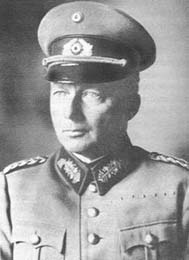
one of the most effective serecretaries the US Navy ever had; born in Boston, a former Rough Rider, a World War I artillery colonel, Chicago publisher and 1936 Republican vice presidential nominee; served from July 1940 until his death in April 1944; investigated the failure of the Pearl Harbor defenses and worked harmoniously with Fleet Admiral Ernest J. King, the irasicble navy commander.
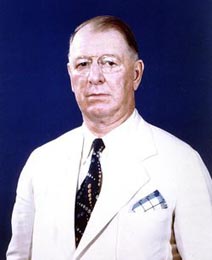
French soldier and one of the few senior officers to rally to de Gaulle in 1940 after the fall of France; commanded the Free French garrison at Bir Hacheim, which held off and armored strike force from the Afrika Korps for ten days during the battle for the Gazala Line in June 1942; in 1944 took command of the French Forces of the Interior after the landings in Normandy; was military governor of Paris for a time following the Allied liberation of France, and served briefly as Minister of National Defense in the 1950s.
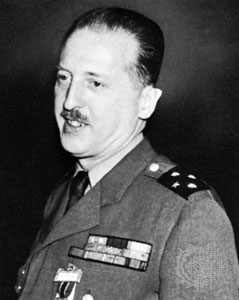
successor to Admiral Yamamoto as commander of the Japanese Navy Combined Fleet after the latter's death in April 1943; had previously served with the Naval General Staff and as commander of the Yokusuka Naval Station; was unable to halt the steady tide of American gains in the Pacific during 1943; his dogged defense of Japanese conquests was increasingly prey to attrition by a series of US counteroffensives, and presided over the major Japanese withdrawals from Rabaul and the Gilbert Islands; died in an air accident as his forces were engaged in withdrawing to the Philippines in March 1944.

Japanese General Staff officer and Minister of War during the 1930s, retired in 1942 to serve as Governor General of Korea before re-entering Japanese political life in association with Adm Yonai (and indirectly, Prince Konoe and Mperor Hirohito), who were urging peace with the Allies; when Prime Minister Tojo was finally ousted in October 1944, replaced him, remaining as premier until his resignation in April 1945, although his cabinet had already suffered a near collapse after the defeats at Leyte and Iwo Jima; his attempts to negotiate with Chiang Kai-shek in order to secure a more favorable peace settlement had also ended in failure; was convicted of war crimes by the International Military Tribunal for the Far East and sentence to life imprisonment.
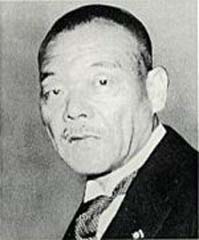
was a Russian Communist revolutionary, first as a member of the Mensheviks, then from 1914 on as a Bolshevik; was effectively exiled by Stalin, who sent her to Mexico, Sweden and Norway as a diplomat, and was thus one of the very few "Old Bolsheviks" to escape death during the Great Purges of the 1930s; was born in St. Petersburg to Mikhail Domontovich, a general in the Russo-Turkish War of 1877-1878 and the head of the chancellery of the Russian administration in Bulgaria from 1878-1879, and Alexandra Masalin-Mravinsky, the daughter of a wealthy Finnish timber merchant; lacked political influence and was appointed by the Party to various diplomatic positions from the early 1920s, keeping her from playing a leading role in the politics of women's policy in the USSR; in 1923, was appointed Soviet Ambassador to Norway, becoming the world's first female ambassador; later served as Ambassador to Mexico and Sweden; during World War II, there were some Nazi discussions that her embassy in Stockholm could have potentially been a channel for German-Soviet negotiations, although they never came to pass; was also a member of the Soviet delegation to the League of Nations.
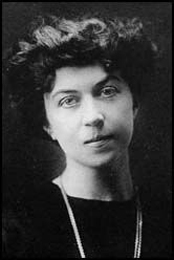
commander of the Japanese Navy 2nd Fleet for the first two years of the Pacific War, was in overall command of many operations against the Allied naval forces in the Pacific, including the invasion of the Philippines, Malaya and Java; commanded the Japanese Southern Force which sank Force Z in the battle for Singapore and subsequently provided the main support forces for the invasion of Midway; later participated in the fighting for the Solomon Islands, at the battle of the Eastern Solomons, Santa Cruz and Guadalcanal; the defeat of his strike force during a final attempt to reinforce Guadalcanal on November 13, 1942 enabled the Allies to save the major air base at Henderson Field and subsequently to threaten New Guinea and Japanese control in the Southwest Pacific; was appointed to the Japanese Supreme War Council in May 1945.

one of the most outstanding Soviet field commanders of the war, began his military career at 15 as a private in the Tsarist Army and joined the Red Army in 1918 as a member of the Bolshevik Party; a survivor of Stalin's purges during 1937, was transferred to command the Kalinin Front Army Group, which played a vital part in holding the Russian northern flank against the German attack on Moscow in the late autumn 1941; the subsequent launch of a Soviet counteroffensive saw his armies force the invading German forces 100 miles back from their positions in a year of bitter battles; but his greatest military achievements were in command of the huge Soviet counteroffensives of 1943 to 1945; now in command of the 2nd Ukrainian Front, directed the northern assault to link up with Marshal Zhukov's 1st Ukrainian Front in a giant envelopment of German forces around Korsun, south of Kiev; in the first half of 1944, his armies drove on to the Vistula in Poland, suffering heavy losses but devastating the German armied in their path; by early 1945, having crossed the Oder-Neisse lin in mid-February, now a marshal, prepared to lead the million men of the 1st Ukrainian Front in the Battle for Belin, which brought the war in Europe to an end; twice decorated Hero of the Soviet Union and awarded the Order of Lenin five times, his contribution to the Soviet victories on the Eastern Front is undisputed; after the war, replaces Marshal Zhukov as C-in-C of Land Forces; was appointed Sovite Minister for Defense in 1944.
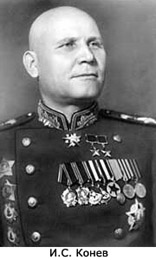
Japanese Prime Minister who served three times between 1937 and 1941; entered politics via a post in the Japanese Home Ministry; between the wars was active in the work to pass a universal male suffrage law, as well as attending the Paris Peace Conference in 1919 as secretary to Kimmochi Saionjii; subsequently criticized the Conference as an effort by the West to preserve the status quo; though a supporter of an expansionist foreign policy for Japan, opposed the extreme militarist and Fascist ideals of the Army factions, and thus came to be seen by many moderates in Japan as an ideal figure to unite the wartime political groups in Tokyo; asked to form a cabinet in July 1937, made little effort to stop the spread of hostilities with China and further undermined the efforts to control the conflict by declaring his unpreparedness to deal with the Chinese Nationalist government in January 1938; in November announced the founding of a 'New Order' for East Asia (a blueprint for Japanese control of China, Manchukuo and ex-colonial territories in Southeast Asia) but resigned in January 1939 over the protraction of the Chinese war; returning to office in July 1940, proved unable to control the steady rise in influence of the extreme Control Faction (Toseiha) led by General Tojo, to stop the war with China, or, finally, to avert the war against America; was replaced as Prime Minister by General Tojo, who had served as his War Minister, and remained politically inactive throughout much of the war, although from 1944 was involved in attempts to bring it to an end, and was working on a plan for constitutional refor when he was arrested in December 1945; committed suicide on learning of the possibility that he would be charged with war crimes, and was condemned posthumously, chiefly on the grounds that he had attended the birth of a totalitarian state in Japan and bore the responsibility of that crime.

the last chief of the German General Staff, appointed on April 1, 1945 as successor to Guderian; was sent by Dönitz to inform the Russians of Hitler's death and negotiate an armistice, but returned to the bunker to report the Russians' unconditional surrender terms and their request that Dönitz come to Berlin to accept it; committed suicide on about May 1, the day before Russian forces captured the bunker.

US 6th Army (Alamo Force) commander, directed operations in the Southwest Pacific and led the reconquest of the Philippines; was in command of the US 3rd Army at the start of the Pacific War; ordered to Australia in January 1941 to command the 6th Army, activated in February, led operations from June of that year under the code-name Alamo Force - essentially a device of General MacArthur's to take direct charge of the special task force and avoid losing operational control of such a large army to the Australian generals (notably General Blamey who was MacArthur's Southwest Pacific land forces commander); from June 1943, commanded almost all Southwest Pacific ground operations - in New Guinea, the Admiralty Islands, New Britain and the Philippines; handing over control of final operations in Luzon in July 1945; was charged with preliminary planning for an amphibious invasion of Japan; after the Japanese surrender, went with the 6th Army as part of the US occupation forces in Japan.
commanded the US 6th Army in 1943-45 in the Pacific theater.
led the German German 18th Army in 1940 in the invasion of neutral Holland and was able to defeat the much smaller Dutch army and continued on into Belgium; defeated the Belgians, took Antwerp and then moved into France; ended this phase of the war at Pas de Calais; his role in this campaign earned him the rank of Colonel General; became commander of Army Group North after Field Marshal Wilhelm Ritter von Leeb was relieved of his command; was seen as politically compliant and was liked by Hitler, who hoped that Küchler would succeed where he believed that Leeb had failed; commanded Army Group North from December 1941 through January 1944, but was unable to achieve any victory at Leningrad; maintained the siege of Leningrad, launching massive bombardments in an attempt to intimidate the Red Army into surrender; was promoted to Field Marshal on June 30, 1942; in January 1944 Soviet troops were able to completely break the blockade of Leningrad; was sacked when he demanded the withdrawal necessary to save Army Group North; was arrested by American occupation authorities and tried by a military court in 1948 in the High Command Trial; was sentenced to twenty years in prison for crimes against humanity but only served eight before he was released in 1953 due to illness and old age; died in Garmisch-Partenkirchen.
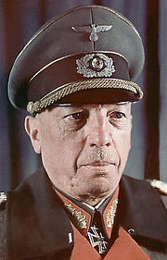
one of the group of younger generals (which also included Konev, Rokossovsky and Govorov) to emerge during the war from the ranks of the Soviet General Staff, stripped of many members during Stalin's purges in 1937; participated in the defense of Kief in 1941 and was subsequently held responsible by Russians for the loss of the city, though it is clear that Marshal Budenny shares responsibility for the Soviet failure; from command of the 1st Guards Army at Stalingrad, was promoted Deputy Commander of the Southwest Front; later directed forces in Poland and at the Battle for Berlin.
